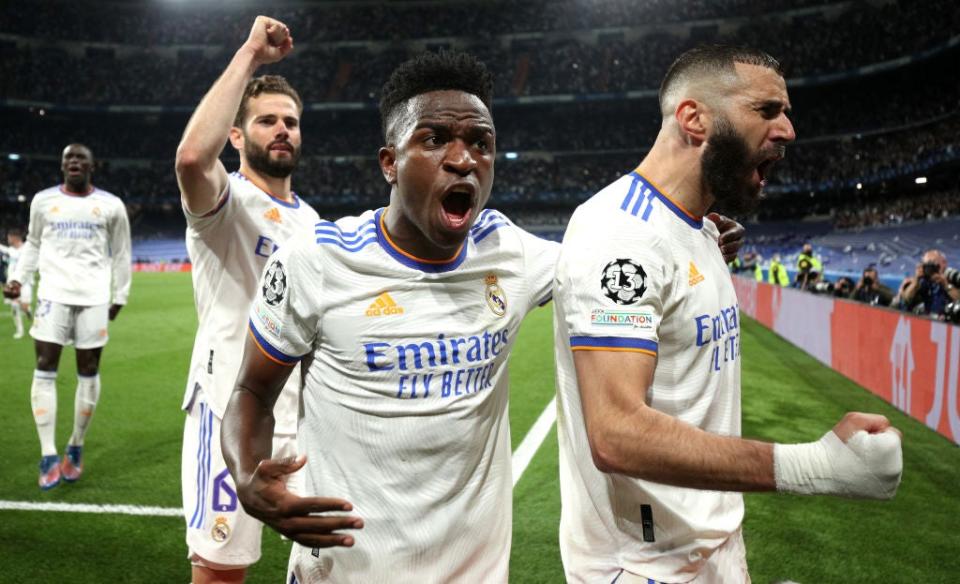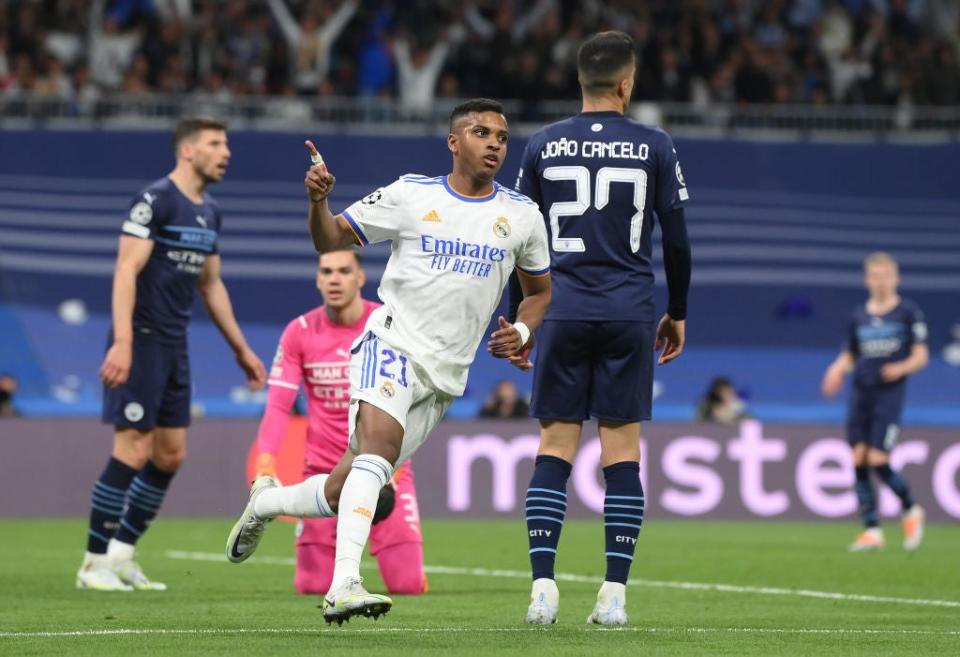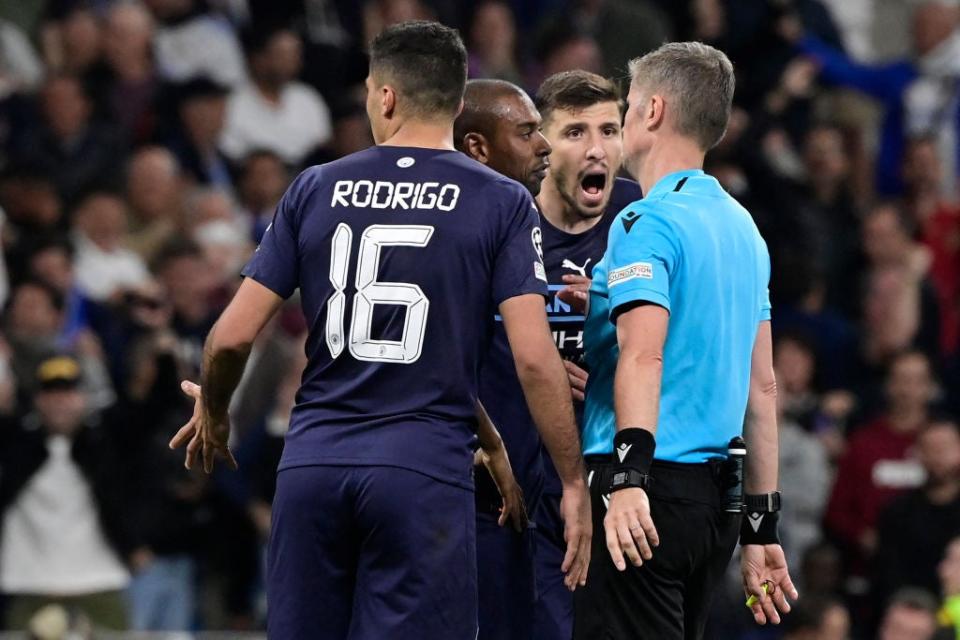Real Madrid produce another sensational comeback to beat Man City and reach Champions League final

Another Champions League game for the ages, but this one so intimately influenced by the weight of history.
Real Madrid believed they could do the impossible. Manchester City feared the inevitable. That is the only way to explain another incredible night in this competition. It’s the only way to read yet another spectacular Madrid comeback, and another cataclysmic Pep Guardiola collapse.
It all built up to this astonishing tie’s climax, infusing it with even more emotion. The faces at the end said so much and more than the details.
Those details are that Carlo Ancelotti’s side came back from 1-0 down in the 90th minute to win 3-1, and make it 6-5 on aggregate, as well as reach a 17th Champions’ League final for the club. They will now be looking to ensure a record 13 becomes a remarkable 14, and stop Liverpool winning their seventh.
It also prevents a fourth all-English final and that grand showdown, while prolonging Guardiola’s agony in this competition.
That was the thing about those details, though – the reality was something else.
To paraphrase a line from great literary fiction, for this was the greatest sporting drama, all Madrid Champions’ League comebacks are alike but each one is amazing in its own unique way.
You could say the same about Guardiola collapses. It all becomes incredibly predictable, but exquisitely enthralling because of that. It is only enriched by what went before.
That’s where the weight of history comes in. It isn’t replaying what we’ve seen before. It is adding to legend, to lore.
That is what the Champions League really is.
Time and again, this competition delivers in terms of pure spectacle. It only deepens the peculiarity of why some of the people involved in this very fixture – particularly Madrid president Florentino Perez – want to change this competition or even replace it.
There is nothing like it. It has everything.
Even a game like this, which had mostly been a classically tense European tie of the more vintage kind, just transformed into another modern epic; another explosion of colour.
So much of the intricate details from the first 75 minutes – Guardiola’s gamble on an unfit Kyle Walker to subdue Vinicius Junior, the very concerted gear shifts – were all just long prelude, mere stage-setting for the real drama to come. Most of it was also nearly divorced from everything that came before it, other than helping to build the emotion, allowing it all to simmer.
It wasn’t, ironically, Riyad Mahrez’s explosive finish that set up the climax. That was actually one more step in the build-up.
There were developments that followed that felt like they were going to become part of something bigger. Two were substitute Jack Grealish’s big misses.
These weren’t just chances squandered. They were moments that fired Madrid’s belief, that fostered that sense of destiny, at a period when it looked like they had run out of ideas and imagination.
Other than Benzema and Luka Modric, though, this Madrid haven’t really been about creativity. They have been about will.
That is the only way to describe what happened in those frantic final few minutes. There was one piece of inspiration, though. That was Ancelotti’s brave introduction of Rodrygo for someone like Toni Kroos. That shouldn’t be forgotten amid all this. It was calculation amid the chaos. As against Chelsea, the Brazilian changed everything. His energy helped a team push themselves to the limit, while forcing City back. That almost sums up his tie-changing goal.

It was so simple, and yet had so much wrapped up in it. Eduardo Camavinga crossed, Benzema headed back, and there was Rodrygo running in. Walker was this time nowhere near him, and neither was any other City defender.
It again showed the difference between these teams, and these clubs, similar to what happened with Paris Saint-Germain.
It played out again, so it’s worth repeating again: while one side just believed they could pull off the impossible, the other seemed bowed by the inevitable.
And that’s the difference genuine history makes. Abu Dhabi can’t buy it. You can only experience it. One wonders what this will do to City? Was some of it the effect of what happened in last year’s final?
Or was it just the whirlwind of sport, the unique energy that envelopes this ground?
Some will no doubt point to familiar complaints. There were the six minutes of added time announced just after Rodrygo’s first. There was referee Daniele Orsato’s immediate point to the spot when Benzema appeared to go down easily.
Both are somewhat hollow. For one, Rodrygo scored another within a minute. They didn’t even need the six.
There was then the fact Ruben Dias did appear to foul Benzema. It was a fair call. It didn’t look an error, and certainly not like the ones the City players were making.

That is why this was another collapse all of their own. It was another collapse we’ve seen before. It is far from the first time that a Guardiola side has conceded three goals in a flurry. That only comes from something deeper.
City went from asserting control over the speed of the whole game to just being hostages to its hurricane pace, unable to keep it together let alone keep the ball. They had lost belief, and consequently lost the game.
It was again everything we’ve seen before, but in an entirely new way.
It was not history repeating itself, but history reasserting itself.
It all means that City and Guardiola are again left dwelling on what might have been, and Madrid look to another final.
That is the difference that matters most.

 Yahoo Sport
Yahoo Sport 



































































